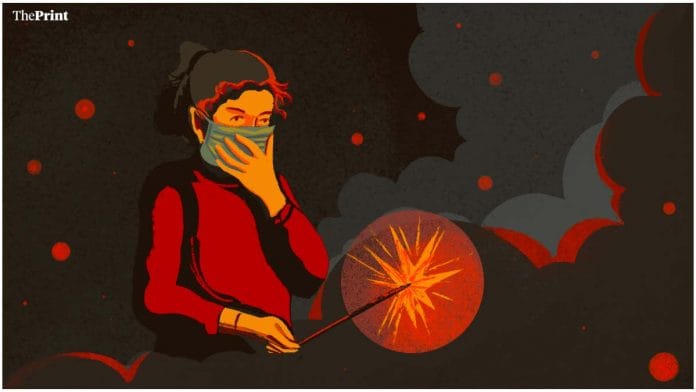The day after Diwali, Delhi recorded its worst pollution levels as usual. But this year was different – there was a ban on sale of firecrackers in most places. Of course, the ban was not strictly adhered to, as is usually the case with any ban in a free country.
Diwali also triggered yet another conservative-versus-liberal conflict across social media and television channels. The traditionalists saw the ban on sale of fireworks as an assault on the rich religious traditions of the Hindu festival. While the liberals complained that the ban was not strict enough, which caused pollution levels to rise again.
What do Indians think – should fireworks be banned during Diwali or not? Prashnam decided to find out. We asked more than 15,000 Indian adults across nine states – Bihar, Delhi, Haryana, Himachal Pradesh, Jharkhand, Madhya Pradesh, Rajasthan, Uttar Pradesh, and Uttarakhand – in the Hindi belt spread across 265 districts and 1,220 assembly constituencies. But this time, we employed what economists call a ‘Randomised Control Trial’. We split the sample into two nearly equal groups, which had people from the same geographies randomly assigned to each group. The first group (Group 1) was simply asked if fireworks during Diwali should be banned due to pollution. The second group (Group 2) had an information treatment – they were told that Diwali fireworks cause pollution, which leads to lung infections in children and death of a million Indians each year. Based on this information, they were asked if fireworks should be banned during Diwali or not.
The idea behind this experiment is to test if informing people or educating them about the ill-effects of pollution leads to a statistically significant difference in their responses. In other words, does an information treatment on matters such as the environment work?
Also read: This is what happens to those arrested in Delhi-NCR for bursting firecrackers around Diwali
Group 1 – Ban fireworks
A significant majority think fireworks during Diwali should be banned for reasons of pollution.
This finding came as a surprise to us since we have all been brainwashed by high-decibel media in recent years into believing that religion trumps all issues in the country.
Evidently not. As our survey shows, 57 per cent of people think fireworks should be banned, once again demonstrating how disconnected Indian news media is from the opinions of Indians.
Remember, this was a large, well-stratified survey of 7,562 people across nine states covering every district in every state and not just a survey of ‘woke liberals’ in urban locations as sceptics of this survey may be tempted to believe. Further, the raw data is made available for anyone to analyse and check.
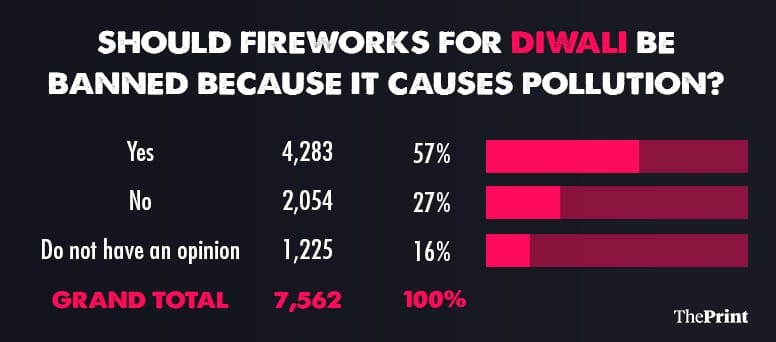
Furthermore, in almost every Hindi-speaking state, the majority chose environment over religious traditions.
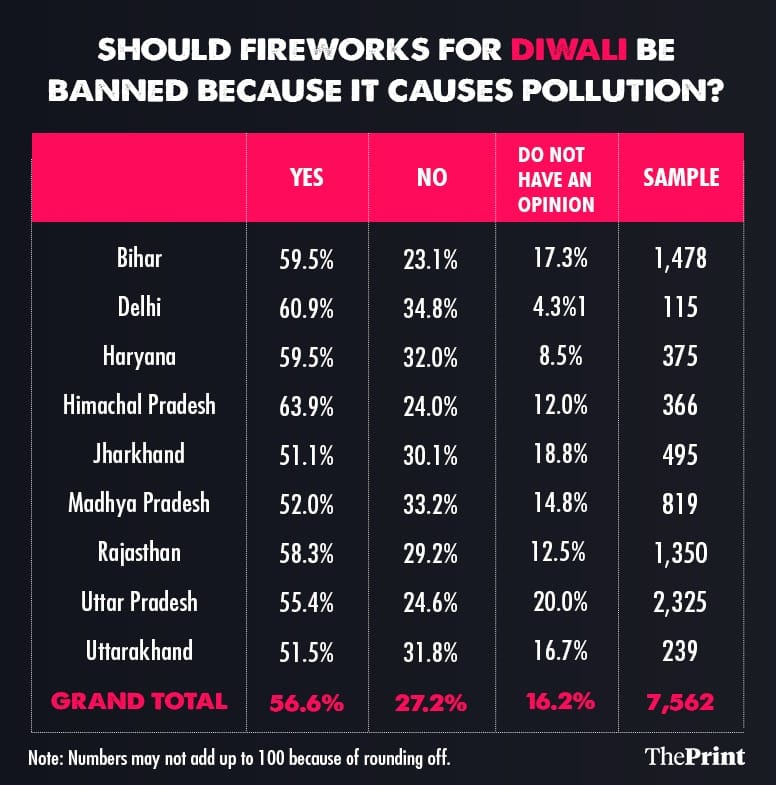
Also read: 80% Delhi-NCR families have at least 1 member ailing due to air pollution, new survey says
Group 2 – How information helps
When a similar group of people from the same geographies were given information of the damage caused by pollution, nearly 70 per cent felt firecrackers should be banned.
So, 20 per cent more people supported the ban on sale of fireworks when they were told about the environmental and health damage. Statistically speaking, we can say with 99 per cent confidence that educating people on environmental issues can make them understand and change their opinions.
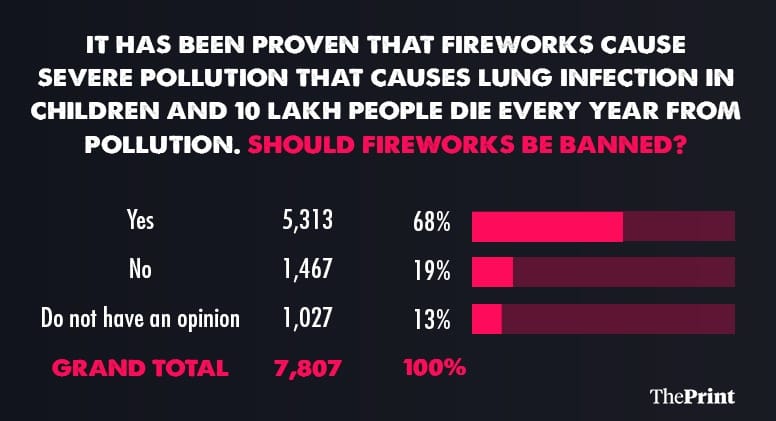
Once again, in every state, there was a significantly higher percentage of people supporting the ban on sale of fireworks.
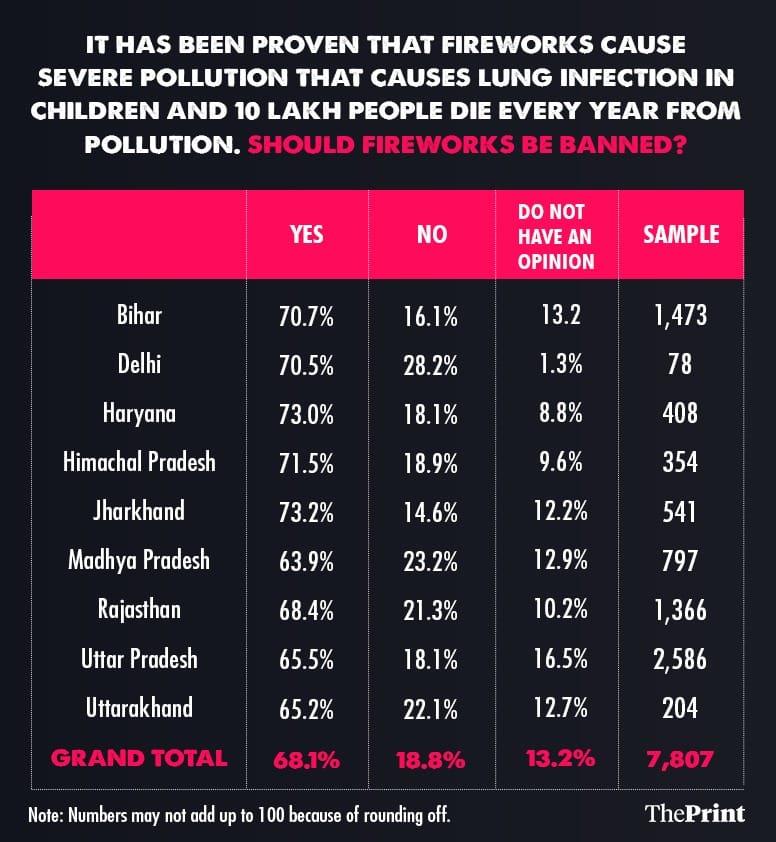
It is clear that, by and large, Indians care more about health and the environment than about religious traditions. This must come as a surprise to many readers of this column who are typically avid consumers of news media and have been led to believe that religion trumps all else in today’s India.
Prashnam, in keeping with its principles of transparency and integrity, makes available the entire raw data of this survey here for analysts and researchers to verify and analyse further, advocated as a best practice of public opinion surveys by experts.
Rajesh Jain is founder, Prashnam, an AI technology start-up that aims to make opinion gathering more scientific, easy, fast, and affordable. He tweets @rajeshjain. Views are personal.
The article is part of ThePrint-Prashnam Vox Pop series.



